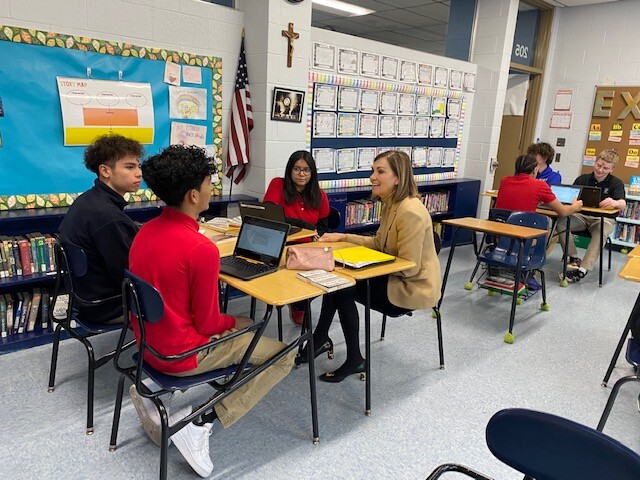
Elevating Education for Every Student
In Iowa, we’re working to provide every student—regardless of income, zip code, or ability—an education that will best prepare them for a successful life.
That means having a system with high-quality educational options and teachers to help them achieve their potential and prepare for college or a career.
Gov. Reynolds’ education priorities for the 2024 legislative session
- Increase teacher salaries
- Improve literacy through evidence-based reading instruction
- Support the expansion of high-quality public charter schools
- Reform Area Educational Agencies to improve special education services for students with disabilities

Teacher Salaries
Iowa ranks among the bottom half of U.S. states for average starting teacher salary according to the National Education Association. By increasing salary minimums for both new and experienced teachers, Iowa will be ranked in the top five states for average teacher salary, greatly improving our ability to attract, recruit, and retain quality educators.
- Invest $47.1 million in new funding to increase the statutory minimum teacher salary from $33,500 to $50,000.
- Invest $25.8 million in new funding to create a statutory minimum teacher salary of $62,000 for teachers with 12 years of experience.
- Invest $23.1 million in new funding to establish Teacher Salary Supplement (TSS) tiers with minimum floors to equalize funding by school district size and for those that are close to or have reached the minimum salary requirements.
- Invest $10 million in ARPA funding to create the Merit Teacher Incentive Fund and reward teachers for student improvement.

Literacy
Reading is the foundation of all learning. Today, 35% of Iowa’s third graders cannot read proficiently. By investing in evidence-based reading instruction, our educators will learn to more effectively teach reading and writing, improving literacy for students and opening more doors to opportunity for them.
- Iowa has invested $9.2 million to provide 5,500 teachers and 1,100 school administrators instructional training in the science of reading. Training began in November 2023.
- Hold Iowa colleges and universities responsible for training education students in the science of reading. Require future Early Childhood, Elementary, K-12 Reading and Literacy Preparation, and Special Education teacher licensure candidates to pass the Foundations of Reading assessment as a condition of graduation.
- Invest $3.1 million to cover the cost of the Foundations of Reading assessment for current teachers who will be required to pass it within three years.
- Iowa schools will be required to develop personalized reading plans for students not proficient in reading by third grade and up to sixth grade.
- School districts will be required to notify parents of the option to retain students who are not proficient in reading in third grade.

Public Charter Schools
Charter schools are tuition-free public schools that provide different types of educational experiences to help students thrive. Some charter schools focus on fine arts or provide students with an intensive STEM curriculum. Others specialize in providing at-risk youth access to resources and opportunities to succeed not only in the classroom, but as productive members of their communities after graduation.
By encouraging the addition of new high-quality public charter schools, Iowa will expand educational freedom for more families and prepare students for their future.
- Invest $5 million to create the Charter School Start-up Grant program to support new or high-performing existing charter schools.
- Allow vacant or underutilized public school district facilities to be available for lease or purchase by other educational entities including nonpublic or charter schools.
- Support the expansion of high-quality charter school options.
Area Education Agencies
In 1974, the Iowa Legislature established a statewide network of Area Education Agencies (AEAs) to serve children and students with disabilities from birth to age 21. Since 2000, their services and infrastructure have grown to include a wide array of other education and media services for school districts across the state.
Today, Iowa’s students with disabilities are performing below the national average, even though Iowa spends $5,331 more than the national average of per-pupil expenditures for special education services.
AEAs received more than $529 million in funding for fiscal year 2023 yet have had little meaningful oversight or accountability over the years. And because special education funds flow directly to the AEAs, school districts have no choice but to use their regional AEA to provide services for their students.
After 50 years, it's time to reform the AEA system and refocus it on its core mission—providing high quality special education services and helping students with disabilities reach their potential.
- Shift state special education funding from AEAs to school districts, allowing them to work with providers that will best meet the needs of their students.
- Shift general supervision authority and related funds from AEAs to the Iowa Department of Education.
- Authorize AEAs to provide only special education services for children and students with disabilities from birth to age 21; special and general education services to juvenile, detention, and foster care children and adults; and some additional services pursuant to current contracts.
- Allow a year-long transition period to implement changes, ensuring stability and improved support for children and students with disabilities.
